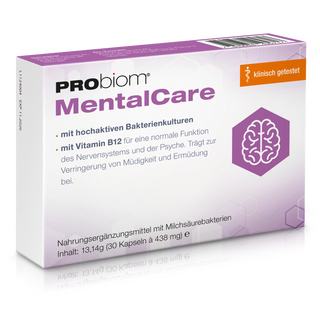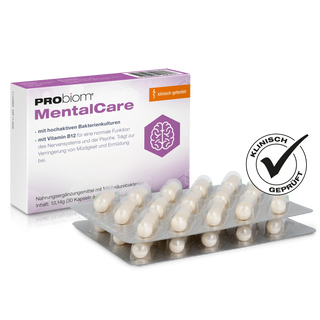Sleep problems are widespread: Many people suffer from difficulty falling asleep, frequent nighttime waking, or unrefreshing sleep. While traditional approaches such as sleep hygiene, lifestyle changes, or medication may help, they often have side effects or fail to address the problem at its core. In recent years, researchers have increasingly focused on the microbiome —the ecosystem of bacteria in the gut—and its astonishing connection to sleep. In particular, certain probiotic strains have been shown to have the potential to promote sleep. But what is the truth behind these claims? Let's take a closer look at the mechanisms, findings from studies, and targeted strains such as Lactobacillus helveticus Rosell®‑52 and Bifidobacterium longum Rosell®‑175 .
The gut-brain axis: A complex communication system
The gut and the brain are in constant communication. This so-called gut-brain axis functions via several pathways: through nerve connections such as the vagus nerve, through neurotransmitters such as serotonin and dopamine, and through the immune system. The gut produces the majority of the body's serotonin, which plays a central role in mood and sleep. An imbalance in the microbiome can therefore contribute not only to digestive problems but also to sleep disorders.
What studies say about probiotics and sleep
Scientific studies now show that certain probiotic strains can have an impact on sleep. In studies with older adults, for example, sleep improved after just a few weeks of consuming Lactobacillus helveticus. Probiotics have also been shown to help calm people and improve sleep efficiency in people under stress. These effects were particularly evident when the probiotics were taken daily over a longer period of time.
How probiotics could affect sleep
The effect of probiotics on sleep is complex. Firstly, they can stimulate the production of sleep-promoting neurotransmitters such as GABA or serotonin in the gut. These neurotransmitters travel through the nervous system to the brain, where they influence sleep patterns. Secondly, some strains have anti-inflammatory effects and reduce the release of stress hormones such as cortisol. Activation of the vagus nerve, which has a calming effect, also plays a role. The combination of these effects can lead to improved sleep quality.
The role of Lactobacillus helveticus Rosell®-52 and Bifidobacterium longum Rosell®-175
The combination of these two probiotic strains, known under the brand name Cerebiome®, has been particularly well-researched. Studies show that taking it over several weeks can lead to a reduction in anxious thoughts and improved sleep architecture. Animal studies have shown more stable REM phases and a shorter time to fall asleep. Subjective stress reduction and an improved quality of life have also been documented. The two strains complement each other: while L. helveticus is thought to be responsible for regulating stress hormones, B. longum strengthens the intestinal barrier and positively influences the immune system.
Practical application and recommendations
For everyday use, it is important that the probiotics are present in sufficient quantities. Many studies have used a dose of at least one billion colony-forming units (CFU) per day. To be effective, they should be taken daily for at least four weeks. Ideally, they should be taken in the evening to allow the effect on sleep to take effect. Products containing the strains L. helveticus Rosell®-52 and B. longum Rosell®-175 should be clearly labeled on the packaging.
Limits and outlook
Despite promising results, research is still ongoing. Not everyone responds to probiotic supplements in the same way, as the individual microbiome plays a major role. Furthermore, long-term studies are needed to assess the lasting effect on sleep. Nevertheless, it is already evident that probiotics can be a useful supplement with few side effects for dealing with sleep problems. Good results can be achieved, especially when combined with other measures such as a healthy sleeping environment, regular sleep times, and stress management.
Conclusion
Probiotics have the potential to positively influence sleep—especially when used specifically. The combination of Lactobacillus helveticus Rosell®-52 and Bifidobacterium longum Rosell®-175 has been scientifically well-researched and demonstrates effects on both physiological and psychological levels. Those looking to improve their sleep naturally will find these probiotics an interesting starting point. Regular intake, patience, and combining them with other sleep-promoting behaviors are key. Research in the coming years will reveal the true potential of these microorganisms.













